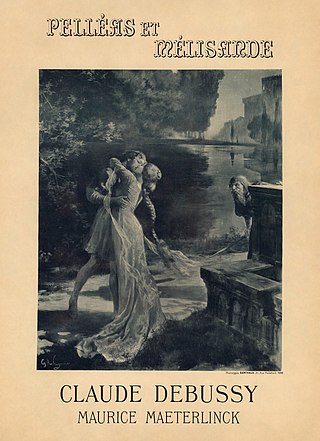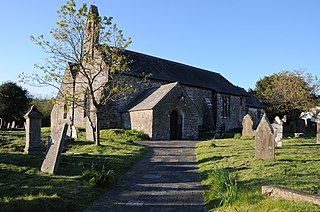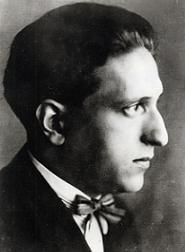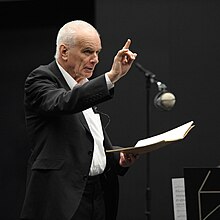
Pelléas et Mélisande is an opera in five acts with music by Claude Debussy. The French libretto was adapted from Maurice Maeterlinck's symbolist play of the same name. It premiered at the Salle Favart in Paris by the Opéra-Comique on 30 April 1902; Jean Périer was Pelléas and Mary Garden was Mélisande, conducted by André Messager, who was instrumental in getting the Opéra-Comique to stage the work. The only opera Debussy ever completed, it is considered a landmark in 20th-century music.
Sir Richard Armstrong is an English conductor. He was educated at Wyggeston Grammar School for Boys and Corpus Christi College, Cambridge, where he was an organ scholar.
Welsh National Opera (WNO) is an opera company based in Cardiff, Wales; it gave its first performances in 1946. It began as a mainly amateur body and transformed into an all-professional ensemble by 1973. In its early days the company gave a single week's annual season in Cardiff, gradually extending its schedule to become an all-year-round operation, with its own salaried chorus and orchestra. It has been described by The New York Times as "one of the finest operatic ensembles in Europe".

Faust is an opera in five acts by Charles Gounod to a French libretto by Jules Barbier and Michel Carré from Carré's play Faust et Marguerite, in turn loosely based on Johann Wolfgang von Goethe's Faust, Part One. It debuted at the Théâtre Lyrique on the Boulevard du Temple in Paris on 19 March 1859, with influential sets designed by Charles-Antoine Cambon and Joseph Thierry, Jean Émile Daran, Édouard Desplechin, and Philippe Chaperon.

The Legend of the Invisible City of Kitezh and the Maiden Fevroniya is an opera in four acts by Nikolai Rimsky-Korsakov. The libretto was written by Vladimir Belsky, and is based on a combination of two Russian legends: those of Saint Fevroniya of Murom and of the city of Kitezh, which became invisible when attacked by the Tatars. The opera was completed in 1905, and the premiere performance took place at the Mariinsky Theatre in St. Petersburg, on February 7, 1907, the last in Rimsky-Korsakov's lifetime.
Hugh the Drover is an opera in two acts by Ralph Vaughan Williams to an original English libretto by Harold Child. The work has set numbers with recitatives. It has been described as a modern example of a ballad opera. Contemporary comment noted the use of humour and the role of the chorus in the work, in the context of developing English opera.

Myddfai is a small village and community in Carmarthenshire, Wales. It is situated south of Llandovery in the Brecon Beacons, and has a population of 415, decreasing to 398 at the 2011 census.

Haddon Hall is an English light opera with music by Arthur Sullivan and a libretto by Sydney Grundy. The opera, set at the eponymous hall, dramatises the legend of Dorothy Vernon's elopement with John Manners, resetting the tale in the 17th century.

The Emerald Isle; or, The Caves of Carrig-Cleena, is a two-act comic opera, with music by Arthur Sullivan and Edward German, and a libretto by Basil Hood. The plot concerns the efforts of an Irish patriot to resist the oppressive "re-education" programme of the English, which has robbed the Irish of their cultural heritage. A quirky "Professor of Elocution" who is hired by the English to continue this "re-education" of the Irish switches sides to help the Irish defend their culture. Romantic complications cause a confrontation between the Irish patriots and the superstitious English at the supposedly haunted caves of Carric-Cleena, and disguises are employed to hold the English off; but the professor ultimately comes up with a solution that works out happily for all.

Sir David Willoughby Pountney is a British-Polish theatre and opera director and librettist internationally known for his productions of rarely performed operas and new productions of classic works. He has directed over ten world premières, including three by Sir Peter Maxwell Davies for whom he wrote the librettos of The Doctor of Myddfai, Mr Emmet Takes a Walk and Kommilitonen!

Arwel Hughes OBE was a Welsh orchestral conductor and composer.

The Golden Legend is an 1886 cantata by Arthur Sullivan with libretto by Joseph Bennett, based on the 1851 poem of the same name by Henry Wadsworth Longfellow. The piece premiered at the triennial Leeds Music Festival. At least 17 performances of the cantata were given in Britain during the first year after its premiere in October 1886, and during Sullivan's lifetime it was widely considered his greatest and most successful work of serious music. Indeed, outside of the comic operas with W. S. Gilbert, this cantata was widely regarded as Sullivan's most successful large-scale composition.
Gwynne Howell is a Welsh operatic bass, known particularly for his performances of Verdi and Wagner roles.
Lisa Jane Tyrrell is an English operatic soprano.

The Visitors is an opera in three acts and a prologue composed by Carlos Chávez to an English-language libretto by the American poet Chester Kallman. The work was Chávez's only opera. Its first version, with the title Panfilo and Lauretta, premiered in New York City in 1957. The final version with the title The Visitors was premiered in Guanajuato City, Mexico, in 1999, twenty years after the composer's death. The story is set in 14th century Tuscany during the time of the Black Death. The libretto uses the device of a play within a play to reflect and intensify the relationships between the protagonists, who in this case are loosely based on characters in The Decameron.
Tornrak is the third opera by Welsh composer John Metcalf. It has an English-language libretto by Michael Wilcox with Inuktitut sections translated by Blendina Makkik. Set between the worlds of the Canadian Arctic and Victorian Britain, it features Inuit throat singing and other extended vocal techniques that give the Arctic scenes a distinct character. The opera was composed between 1986 and 1990 when Metcalf was working in Canada. It was first staged in 1990 in a co-production by the Banff Centre, where Metcalf worked, and the Welsh National Opera who had commissioned the work.

Blodwen is an opera in three acts composed in 1878 by Dr Joseph Parry to a libretto by Richard Davies. It was the first opera written in the Welsh language.

Šarlatán, Op. 14, is a tragicomic opera in three acts by Pavel Haas to his own Czech libretto, after a 1929 German-language novel, Doktor Eisenbart, by Josef Winckler (1881–1966), which was based on the life of the travelling surgeon Johann Andreas Eisenbarth.
Flammen (Flames) is an opera in two acts and ten scenes composed by Erwin Schulhoff, his only opera. The original libretto in Czech was written by Karel Josef Beneš. The opera had its world premiere at the old National Theatre in Brno on 27 January 1932 in Czech under the title Plameny. It was not heard again until the mid-1990s, when it was performed in its German translation by Max Brod as Flammen. Its story is a surrealist retelling of the Don Juan legend with elements from the legend of the Wandering Jew, and heavily influenced by Freudian psychology. Unlike the title character in Mozart's Don Giovanni based on the same legend, Don Juan is not punished by being dragged down to Hell, but instead is condemned to live forever.
The Physicians of Myddfai were, according to local folklore, a succession of physicians who lived in the parish of Myddfai in Carmarthenshire, Wales.












